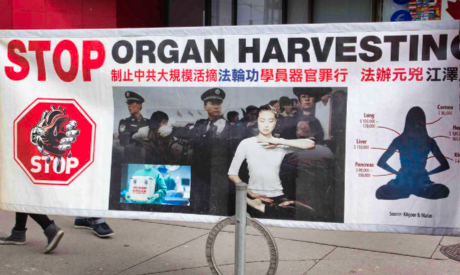Two new reports conclude that China is engaging in organ harvesting and a child separation campaign against the country’s Uighur Muslim minority.
China’s ambassador to the U.K., Liu Xiaoming, has denied a BBC investigation’s findings, which concluded that Muslim children in the Uighur-majority region of western Xinjiang are being systematically separated from their parents.
The extensive investigation, commissioned by the BBC and led by leading German researcher Adrian Zenz, has found that more than 400 Uighur children in a single township have lost both their parents to prison or China’s vast network of internment camps.
Chinese authorities have describe the camps as vocational education training centers aimed at curbing terrorism. But U.S. officials say that between 1 million and 3 million Uighurs have been arbitrarily imprisoned in “concentration camps” where detainees are indoctrinated and even tortured.
Just as China began detaining Uighur adults en masse, authorities also began rapidly rolling out construction of thousands of military-style full-time boarding schools for Uighur children, Zenz found.
This “weaponization of education and social care systems” is critical to “the region’s hair-raising political re-education and transformation drive,” he wrote, and seems to be a pre-emptive measure against the potential fallout of China’s “war on terror” against Uighur resistance.
“Increasing degrees of intergenerational separation are very likely a deliberate strategy and crucial element in the state’s systematic campaign of social re-engineering and cultural genocide in Xinjiang,” Zenz wrote.
In southern Xinjiang, Chinese authorities have spent about $1.2 billion on building and upgrading kindergarten facilities, including large-scale expansions of dormitory space and extensive security measures.
In 2017 alone, the number of children enrolled in Xinjiang’s kindergartens spiked by more than half a million. Muslim minority children comprised over 90 percent of that jump, per publicly available government statistics.
In these schools, Uighur and other local languages are largely banned. State directives order schools to focus on “thought education.”
“Xinjiang’s schools have become like the colonial boarding schools used by the United States, Canada or Australia, to assimilate native ethnic populations,” Zenz concluded in his report.
“China has declared war on faith,” Sam Brownback, ambassador-at-large for International Religious Freedom, said June 21 at an event introducing the 2018 International Religious Freedom Annual Report.
“We’ve seen increasing Chinese government abuse of believers of nearly all faiths and from all parts of the mainland.”
Brownback also excoriated reports that Chinese authorities have subjected prisoners of conscience to forcible organ harvesting, which he said “should shock everyone’s conscience.”
The reports came from an independent tribunal initiated by the International Coalition to End Transplant Abuse in China, which confirmed long-standing allegations that China is forcefully harvesting the organs of marginalized people in prison camps, sometimes when patients are still alive.
“It is no longer a question of whether organ harvesting in China is happening. That dialogue is well and truly over,” said Susie Hughes, the group’s executive director.
On June 17, the tribunal reported that “forced organ harvesting has been committed for years throughout China on a significant scale,” making practitioners of the beleaguered Falun Gong spiritual movement one of the country’s main sources of organs. China banned the Falun Gong in the 1990s and has smeared the meditative discipline as an “evil cult.”
While Chinese officials announced the country would stop taking organs from executed prisoners in 2014, the tribunal concluded that the practice is still taking place.
The tribunal found that it was possible that Uighur Muslims’ organs have been sold against their will to the billion-dollar transplant industry.
Citing a lack of evidence that China has dismantled the infrastructure used for its organ transplantation industry, as well as the country’s inability to explain its organ sourcing, the tribunal said, the massive scale of the “concerted persecution and medical testing” of Uighurs suggests that “evidence of forced organ harvesting of this group may emerge in due course.”
The tribunal determined that it was “beyond reasonable doubt” that China is committing “crimes against humanity” and urged international courts to investigate whether the crimes rose to the level of genocide.
Forced organ harvesting, the tribunal wrote, “is of unmatched wickedness even compared — on a death for death basis — with the killings by mass crimes committed in the last century.”
- Aysha Khan is a Boston-based journalist reporting on American Muslims and millennial faith.
